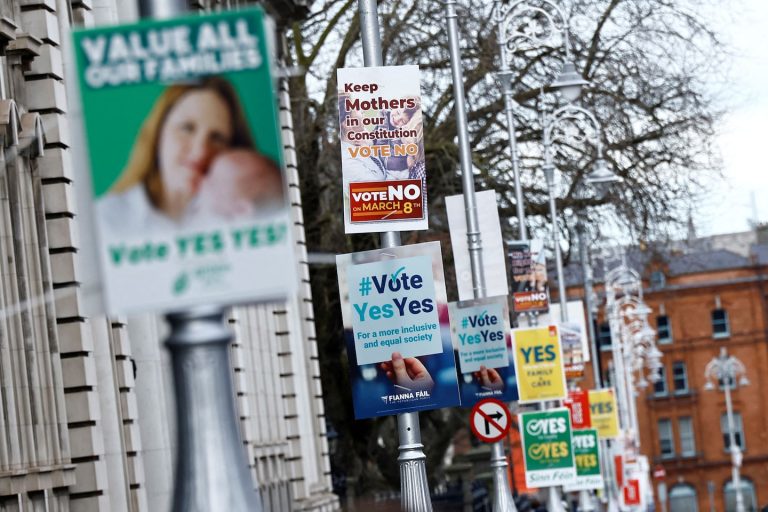While there is widespread support for removing the outdated “women in the home” clause from the Constitution, there are concerns about what it could replace it with. The second referendum will then address how to define family. Polling stations opened their doors on Friday at seven in the morning and closed at ten in the evening, and the results are expected to appear at midday on Saturday.
The part of the Irish Constitution, dating from 1937, that has attracted the most attention is a clause that states: “Mothers shall not be compelled by economic necessity to engage in work to the neglect of their duties at home.”
Mary McAleese, the former president of Ireland, said there were parts of the constitution that were “badly outdated”. She said the “women at home” clause “is no longer appropriate for an Ireland keen to promote gender equality”.
In recent years, Ireland, once deeply conservative and among the poorest countries in Western Europe, has emerged as a socially liberal country. In 1995, Ireland voted to legalize divorce; In 2015, same-sex marriage; In 2018, Ireland repealed its abortion ban.
At first, it seemed that a simple rewrite of the Constitution would be a fatal blow to the government. While some opinion polls showed a “double yes” vote lead, analysts said the outcome was far from certain given the confusion, criticism and possible low voter turnout.
Thomas Finn, a history lecturer at the University of Galway, said there had been “a desire to remove this language from the constitution for a long time, but the question became, what should replace it?”
He said the government might have been “more successful in deleting it, because it is now controversial, or at least there are concerns about the language proposed to replace it.”
Disability activists, lawyers and the Catholic Church are calling for a “no” vote on the women's clause because the new language introduces ideas about family members' responsibility to care for each other, and they say the proposed changes raise concerns about welfare, disability and taxes.
The first proposed change is known as the “Family Amendment” and is presented to voters on a blank piece of paper. This involves defining family. The government wants to expand its scope beyond marriage to include those in “permanent relationships”. The government says this change would recognize that families can be based on relationships other than marriage, such as unmarried parents, single parents or grandparents.
Prime Minister Leo Varadkar said: “I want there to be a yes vote that says all families are equal.” The last interview. “This is about making sure that all families, of all shapes and sizes in Ireland, are equal.” Varadkar is in a same-sex relationship but is not married.
More than 40% of children in Ireland are born out of wedlock.
Critics have raised concerns about the term “permanent relationship,” which they say is unclear, and that the ambiguity of the term could have unexpected legal consequences.
Michael McDowell, a lawyer and former justice minister, was among those who said he would vote “no” in this referendum.
“Everyone knows whether they are married or not,” he wrote in a post on his website. “No one knows who is or is not in a ‘permanent relationship’ unless a court decides in a contested case that it is ‘long-term.’” “No one knows how and when the 'permanent relationship' between two adults ends in the eyes of the law.”
The second proposed change is known as the “Care Amendment” and is presented to voters on a green ballot. In this regard, the government seeks to delete the text that says, “Mothers may not be forced by economic necessity to work while neglecting their duties at home.” This text will be replaced with a paragraph saying that the state will “endeavour” to support “the provision of care by family members to each other.”
Disability activists They said the alternative text suggests that responsibility for caring for dependents rests primarily with the family. They argue that it should be the responsibility of the state to care for all its citizens equally.
“What started out as a straightforward, ‘let’s delete this’ thing, has become much more complex,” said Jill McElroy, professor of politics at Trinity College Dublin.

